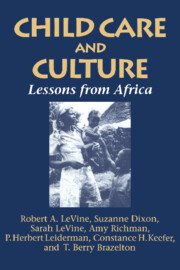Book contents
- Frontmatter
- Contents
- List of tables and figures
- Foreword
- Acknowledgments
- Introduction
- Part I African infancy: Frameworks for understanding
- Part II Parenthood among the Gusii of Kenya
- Part III Infant care and development in a Gusii community
- 6 Infant care: Cultural norms and interpersonal environment
- 7 Survival and health: Priorities for early development
- 8 Communication and social learning during infancy
- 9 Variations in infant interaction: Illustrative cases
- Part IV Interpretations
- Appendix A Fieldwork procedures: Initial phases and planning
- Appendix B Coding categories for spot observations
- Appendix C Blankhart Nutrition Questionnaire
- Appendix D Temperament Assessment Method
- Appendix E Coding categories for narrative observations
- Appendix F Coding categories for face-to-face interaction
- Appendix G Coding categories for maternal teaching task
- Appendix H Supplementary tables
- Notes
- References
- Index
- Plate section
7 - Survival and health: Priorities for early development
from Part III - Infant care and development in a Gusii community
Published online by Cambridge University Press: 11 May 2010
- Frontmatter
- Contents
- List of tables and figures
- Foreword
- Acknowledgments
- Introduction
- Part I African infancy: Frameworks for understanding
- Part II Parenthood among the Gusii of Kenya
- Part III Infant care and development in a Gusii community
- 6 Infant care: Cultural norms and interpersonal environment
- 7 Survival and health: Priorities for early development
- 8 Communication and social learning during infancy
- 9 Variations in infant interaction: Illustrative cases
- Part IV Interpretations
- Appendix A Fieldwork procedures: Initial phases and planning
- Appendix B Coding categories for spot observations
- Appendix C Blankhart Nutrition Questionnaire
- Appendix D Temperament Assessment Method
- Appendix E Coding categories for narrative observations
- Appendix F Coding categories for face-to-face interaction
- Appendix G Coding categories for maternal teaching task
- Appendix H Supplementary tables
- Notes
- References
- Index
- Plate section
Summary
The first priority of Gusii parents is to provide an infant with the nurturance and protection to survive in the face of risks presented by physical hazards, infectious diseases, and seasonal food shortages. Gusii customs of infant care, as interpreted in the previous chapter, reflect an adaptive strategy for minimizing the survival risks and promoting physical growth in the first years of life, within a context of high marital fertility. The extent to which they actually achieve these goals is examined in this chapter. In considering whether folk practices of reproduction and infant care operate as an adaptive system, we pose three questions: (1) Do these practices normally result in adaptive outcomes, namely, increased probabilities of infant survival, as indicated by body size, physical growth, and motoric/behavioral maturation? (2) Are they responsive to variations in the age and health status of infants? (3) Are they responsive to environmental changes, for example, in the availability of food or medical care? We also consider the vulnerability of these practices, that is, the conditions under which they permit infant health and survival to be jeopardized.
In the mid-1970s, when the evidence presented here was collected, environmental risks to child survival in Gusiiland had changed from their values of 20 years earlier; this change must be taken into account in any assessment of the adaptiveness of infant care customs. During the 1974–1976 period, in general, food shortages posed more of a risk to infant health and survival than in earlier times.
- Type
- Chapter
- Information
- Child Care and CultureLessons from Africa, pp. 169 - 195Publisher: Cambridge University PressPrint publication year: 1994



